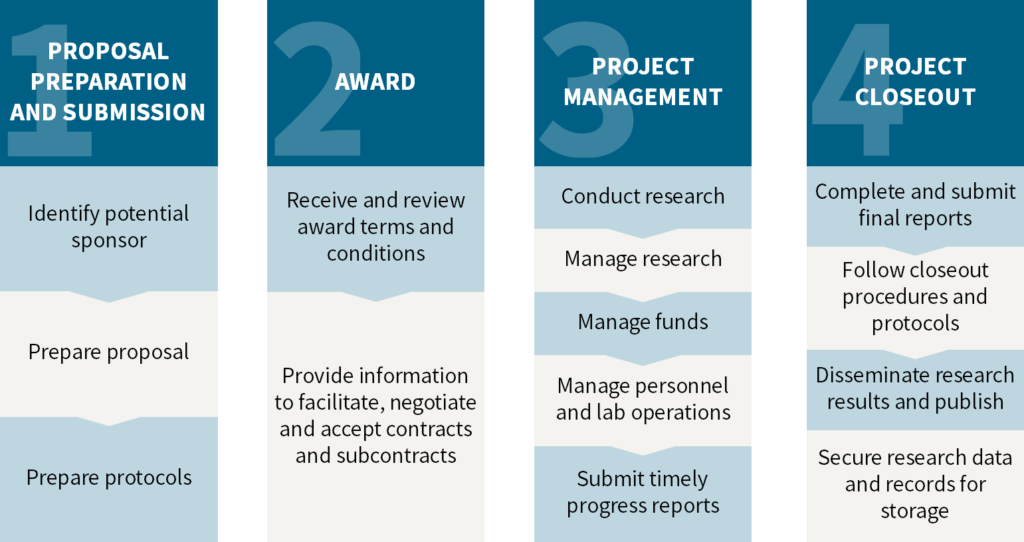The Office of the Vice Chancellor for Research (OVCR) is dedicated to fostering a successful research enterprise at Washington University. Our research.wustl.edu website is where we share a wealth of resources to assist through the research administration process.

Our website is sorted by topic (human subjects research, award management, contracts, research data, etc…). Topics house relevant policies, guidance, resources, and contact information. There are also listings of funding opportunities, core facilities, and upcoming events and trainings.
The OVCR has several offices that assist faculty throughout the research lifecycle.

Find funding
Research.wustl.edu/funding showcases federal, private, early career, and internal seed funding opportunities.
The Research Development Office (RDO) offers one-on-one consultations with faculty to setup funding alerts, discuss funding strategies, and diversifying funding portfolios.

Find collaborators
The Research Development Office assists faculty in identifying collaborators across schools and disciplines, facilitates new team development, and hosts topic specific Research Networking Group initiated by faculty.
Research Education and Information hosts an annual faculty forum with opportunities to foster collaborative relationships.

Leverage data-driven insights for your best chance at funding
The Research Analytics team provides a suite of interactive dashboards that provide insights on sponsor funding trends, funding by institutional peers, successful funding of projects by specific NIH study section, and more.

Successfully submit proposals and execute outgoing subawards
Proposal Development for Faculty shares information and resources for each phase of preparing a proposal. There you can find resources and support for planning, finding funding, writing, submitting, and final checks before accepting an award.
The Office of Sponsored Research Services (OSRS) partners with Department Research Administrators to comply with sponsor, government and University requirements for preparing and submitting all proposals and executing outgoing subawards.

Negotiate contracts
The Joint Research Office of Contracts (JROC) drafts, reviews, negotiates, and signs research-related agreements on behalf of the university. Agreements processed by JROC include subawards, industry-sponsored clinical trials, data transfers, confidentiality agreements, and other similar agreements.

Train postdocs
The Office of Postdoctoral Affairs provides resources and professional development training. They can assist with effective mentoring practices, guidance on university policies, and appointing postdocs.

Keep up with Research News
Research Education and Information manages the Research News email bulletin service. Topics include funding opportunities, professional development opportunities, and policy changes.
Faculty paid from sponsored funds are automatically subscribed. Anyone can sign up or manage subscriptions at researchnews.wustl.edu.

Faculty-to-faculty advice
The Faculty Fellows in Entrepreneurship and International Research can help faculty navigate these two areas and provide guidance on university policies and regulatory requirements.

Compliance Training Requirements
There are many policies and regulations setting the training requirements for researchers. The Trainings for Researchers page provides information on several of the required compliance trainings, as well as resources for staff to monitor completions.

Research with human participants
The Human Research Protection Office (HRPO) works closely with the Institutional Review Board (IRB) to ensure human research studies are conducted ethically. HRPO Help Services include a phone and chat service to answer in-the-moment questions, weekly office hours ,and IRB consultations for in-depth guidance on a research project.
The OVCR’s Human Subjects Research page provides a wealth of information and resources on the many regulations, policies, and offices related to human subjects research.
Human Research Quality Assurance (HRQA) provides study documentation guidance, resources that aid in performing high quality research, tailored education, audit preparation, and training in Good Clinical Practice.
The Center for Clinical Studies provides researchers with administrative and clinical research services from the initial proposal phase through study close-out.
The Healthcare Innovation Lab is a cross-disciplinary organization between BJC HealthCare and Washington University School of Medicine to provide leadership in health system innovation. The Lab identifies and develops applied innovations that are potentially scalable regionally and nationally that directly impact health care delivery and strengthen population health approaches within St. Louis.
CFR Part 11 Compliance – Electronic Records & Signatures is a hub for information for researchers at WashU related to the FDA’s rules and regulations pertaining to how electronic records are managed.
Mobile Health (mHealth) research is focused on the use of social media, smartphone devices, tablets, web sites, sensors, wearables and/or other remote technology to measure and improve health research and outcomes.
Trial-CARE provides enhanced support to faculty conducting investigator-initiated clinical trials through the streamlining of clinical trial startup and implementation.
Necessary Elements is a three-day introductory course providing an overview of research ethics and the research process from study origination through project close-out.

Research with animal models
The New Investigator Resources page offers helpful links, webpages, and FAQs for Principal Investigators starting research at WashU.
The Institutional Animal Care and Use Committee (IACUC) can help you write a protocol that is consistent with federal and university animal welfare policies while still meeting the goals of your study.
The Division of Comparative Medicine (DCM) provides veterinary care, husbandry, animal procurement, and technical services for animals housed on campus. DCM veterinarians consult on study design and surgical/anesthetic plans. DCM offers training, Pharmacy Stockroom, Diagnostic Lab, dosing, sampling, and anesthesia/surgery support to accelerate your studies.

Accurately disclose conflicts of interest
The Conflicts of Interest (COI) program supports the implementation of the University’s Individual and Institutional Research COI policies. Faculty committees review financial disclosures and research activities to assure that the objectivity and integrity of the researcher, university, and academic research, training, or other activities are not compromised or perceived to be compromised by considerations of personal gain or financial benefit.